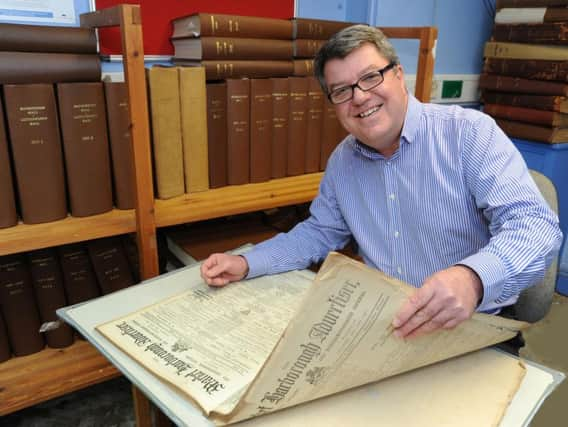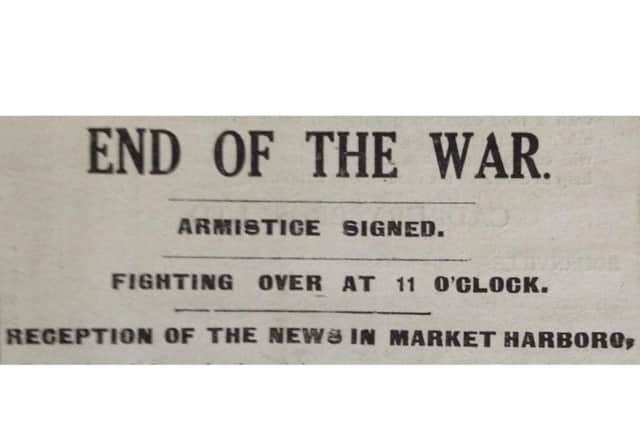John's real-time WW1 blog: Market Harborough's bittersweet reaction to the Armistice


Eloquent words greet the Armistice news in the November 12, 1918, edition of the Market Harborough Advertiser and the editor perfectly captures the mix of joy – and sadness.
Church bells ring, factories close, workgirls ‘bedeck their hair in ribbons’ and The Square, High Street and St Mary’s Road are thronged with flags and people.


Advertisement
Advertisement
However, the editor adds: “It was quite evident that while everybody without exception rejoiced at the welcome news to many, the joy contained a strong element of sadness reminding them as it did that while others would have the pleasure of welcoming home, and that very shortly, their loved ones, such a pleasure would not be theirs, as in their case either a husband, father, brother or betrothed had made the supreme sacrifice and would never return."
There are also what turn out to be prophetic words from the editor: “However, all rejoice in the fact that the terrible slaughter that has been taking place since August 1914 has now ceased, never, it is hoped, to be renewed in the history of mankind.”
The story, which is headlined in capital letters END OF THE WAR, also describes the incredible excitement that greets the Armistice on the eleventh hour of the eleventh day of the eleventh month.
The news is made known ‘by the ringing of the parish church bells’. The report continues: “In an incredible short time flags were hoisted upon flag poles that had not known the presence of a flag for more than four years, and Union Jacks and the flags of the Allies were suspended from the windows of almost every house and shop in the main streets.
Advertisement
Advertisement
“The workpeople flocked from the factories in their eagerness to get the ‘splendid news’, as one and all described it confirmed and the local drapers were literally raided by the workgirls for ribbons with which to bedeck their hair.”
In fact the High Street store Shindler and Douglas is quick of the mark and is advertising ‘thousands of cotton and bunting flags from a few inches to four yards long, British, Colonial and Allied, and many thousands of yards of drapery in British and Allied colours in cotton and bunting’.
And they ramp up the excitement by concluding ‘it is expected that the demand will be enormous’.
Clearly many heed the advice of the store. “People thronged the streets in the centre of the town, all wearing rosettes or red, white and blue tokens or flags, everywhere in fact there was evidence of the joy felt that the war, which had waged so fiercely for more than four years, was now at an end,” says a second descriptive report in the November 19, 1918, edition – although there are no photographs to capture the scenes.
Advertisement
Advertisement
Selections of patriotic music are played by the Territorial Band in The Square and in the afternoon there is a procession with members of the Volunteer Corps acting as torchbearers.
“Every street traversed added to the length of the procession and when it reached its destination in The Square the place was crowded from end to end.”
And there is a fitting climax to the procession with an open-air picture exhibition projected onto a screen fixed to the front of the aforementioned Shindler and Douglas store where ‘the movies were visible for everybody’.
The weather is ‘delightfully fine’ and the ‘wind-up of the procession provides a monster audience’.
Advertisement
Advertisement
But there is sad news to report as well. Sergeant Frank Smith of Caxton Street has died.
The report says: “His wife in response to a message that her husband was lying dangerously ill in hospital in France, started last week on the journey to see him, but while on the way received the sad news that he had died.”
There is also news that Sergeant James Peberdy of High Street, Kibworth Beauchamp, has been killed in action. The 30-year-old leaves ‘a wife and two small children’.
There is also a devastating public admission that the flu pandemic sweeping the world has hit the town.
Advertisement
Advertisement
The report says: “Residents of Market Harborough at the beginning of the present month were congratulating themselves on the fact that they had been almost immune from the prevailing epidemic of influenza, but during the past week it has manifested itself with unexpected severity.
“Not for a long time have there been so many deaths in the town and district in so short a period and the great majority of cases have been caused through influenza.”
Hardest hit apparently is the Remount Depot ‘where several deaths have occurred’. Sadly there are many more to come and future editions of the Advertiser publish the details of an increasing number of people who succumb to the virus.
There is a long report of the military funeral of Private Albert Martin, whose death seems to encapsulate all that is tragic about the war and this latest killer threat.
Advertisement
Advertisement
Martin, of Langton Road, Great Bowden, had fought with bravery during the final battles of the war and had survived being gassed and wounded. He was brought back to England and ‘sent to Tidworth Camp after his discharge from hospital’ only to be one of the many to catch the virus.
It is a devastating blow to his mother and father who had lost their only other son Private William Martin, who was killed in action at the beginning of September.
For what remains of the Martin family – and many others – the Armistice news is a bittersweet moment.
- This column is published every Monday by John Dilley on the Newspapers and the Great War website and will continue until the 100th anniversary of the final armistice in November
2018.
Advertisement
Advertisement
- My fellow researcher and De Montfort University lecturer David Penman is conducting a similar real-time project with the Ashbourne Telegraph. Check out his Great War Reports.
- Check out this week’s Harborough Mail for current news from the Market Harborough area.